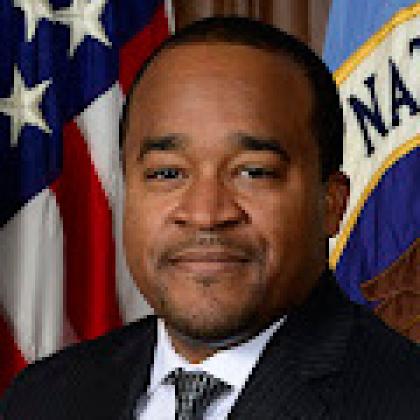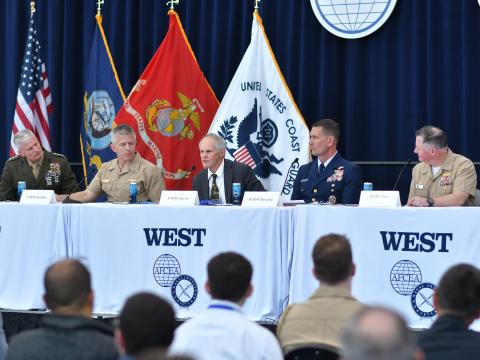Quantum Preparation: Buying Time for Fielding
The U.S. National Security Agency (NSA) is preparing for the advent of quantum computing by laying a foundation now for its fielding across the agency, said Cedric Terry, chief of Encryption Production & Solutions Group, Cybersecurity Directorate, NSA, on Thursday at AFCEA’s TechNet Cyber conference in Baltimore.
“We literally have the ability to drive national security systems toward post-quantum crypto-solutions today, and that is exactly what we are doing,” Terry noted. “It is not just about the products and services, but it's really about the operational management, and how we overlay our processes and management implementation on the products that we're developing.”
Indeed, quantum computers provide powerful compute capabilities and present risks from adversaries armed with future encryption-breaking quantum machines. Adversaries are already trying to steal vital U.S. military information now to save it for when they can break U.S. protective cryptology later when quantum computers are more developed.
“Quantum computing is going to be a game changer,” Terry said. “It is really, really going to just change the way that we look at encryption and the cryptographic ecosystem. And although it is a game changer for us, it also presents a threat. In the wrong hands of an adversary with intentions to do us harm, cryptographically relevant quantum computers have the potential to break existing public keys, we know it.”
For the NSA, which is charged with protecting the nation’s most important information, the evolution of the cryptographic ecosystem is crucial to get right from the beginning, Terry emphasized, especially as the United States has a goal of being quantum resistant by 2035.
“We oversee the end-to-end, or the totality of our keys, codes and crypto mission that secure warfighter communications, weapons and satellite systems, as well as protect our most sensitive data,” Terry stated. “We look at the PRC [the People’s Republic of China], the acceleration of the technology challenge, and the growing number of state and non nation-state actors, as they could have tremendous implications and ramifications for our national security and the defense industrial base. And as those threats continue to evolve, we have to equip these systems with modern cryptography security to counter the threat that we're seeing today.”
As such, the agency is working on “the totality of this ecosystem, not just the algorithms.” This includes laying a foundation now for how quantum computing will be implemented across the agency, including how tools will be deployed and devices built.
“We are standardizing the specifications and requirements now to reduce our time for developing as well as to reduce the time for fielding these capabilities,” Terry shared. “We are putting a lot of time and effort into not only the standards right now, but also the initial planning that we need to do, so that we can buy down some time from a fielding perspective.”
Building that foundation to field quantum computing is not easy, Terry continued, as it is an intricate set of systems that need to be protected.
“We support millions of products and devices for our warfighters across the globe,” he noted. “Additionally, we not only support U.S. forces, but also our international partners in NATO. We provide a management infrastructure to key the devices that are out there that are protecting our warfighters and our partners every day. These systems are really, really complex.”
Over the next decade, the agency will continually reassess the strategic environment to understand adversaries’ capabilities and technology against U.S. protective encryption. The day is coming when they might have to stop using some of the current algorithms.
“We consistently have to assess the strength of those algorithms, and at times, we may have to declare some of those algorithms obsolete so that we can actually keep our system safe,” he observed.

We are standardizing the specifications and requirements now to reduce our time for developing as well as to reduce the time for fielding these capabilities.
Terry also expects the quantum computing to be akin to classical computing, in the sense that quantum computing will offer applications in the cloud as well as on premise and offer advanced cybersecurity tools.
“In the near term, I think we will continue to see increased availability of quantum computing services in places like the cloud and initial development of on-premise quantum computing hardware,” Terry explained. “In the longer term, as the current generation of quantum computing continues to improve, we will start to see practical applications in data analytics, machine learning and optimization: all of these are areas that are extremely, extremely important to cybersecurity. Quantum computing will be able to accelerate the classification and clustering of algorithms for complex datasets that show up from day to day in cybersecurity.”
And as the military adopts quantum computing, Terry sees a beneficial cascading effect.
“If the U.S. government is doing this and the NSA is leading this effort, and we are requiring quantum computing to be in place to protect our national security systems, imagine the domino effect on industry,” he said. “This is not something that we're taking lightly, and this is something that we clearly recognize that we the government cannot get there without strong industry relationships and partnerships.”
Lastly, Terry pressed industry to act now.
“There is a sense of urgency based on how fast the technology is developing,” he said. “Ultimately, we want all of our customers across the U.S. government as well as our partners to start planning for this major technological implementation and transition now. Time is of the essence ... and if you look at the totality of the things that need to be done and the fielding that we need to have, [2035] is literally right around the corner."
TechNet Cyber is an annual event held in Baltimore, Maryland, organized by AFCEA International. SIGNAL Media is the official media of AFCEA.



Comments